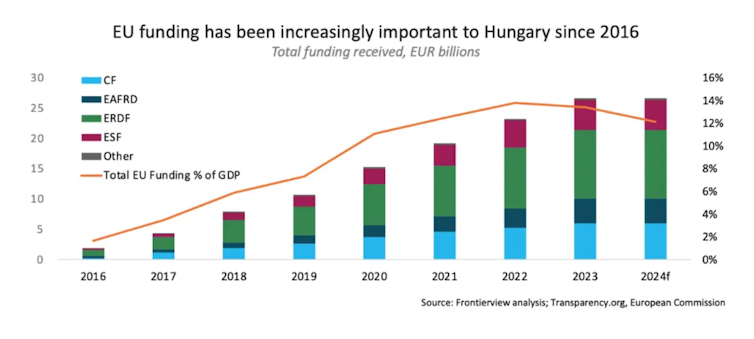On 1 July, Hungary will take over the rotating presidency of the Council of the European Union, with the term lasting until 31 December 2024. This has provoked unease in the European Parliament due to infringements by Hungarian prime minister Viktor Orbán’s government against the rule of law and the EU’s strategic interests.
Though the far right surge in recent EU elections has given Orbán a boost, the EU’s political agenda in the coming months may limit Hungary’s influence on the Council.
The Hungarian presidency has already courted controversy with its unoriginal Trump-imitating slogan “Make Europe Great Again (MEGA)”. While Hungarian diplomats deny that is has been copied, Orbán’s admiration for the US tycoon is no secret – he has even remarked that the Council presidency will coincide with the upcoming US elections.
Orbán also does little to hide his affinity with Putin – who he congratulated on his recent re-election – or with Xi Jinping, despite the Hungarian government’s strong anti-communist stance. Additionally, Orbán has consistently criticised Ukrainian president Volodymyr Zelenskyy, blaming him for the outbreak of the ongoing Russo-Ukrainian war.
Hungary’s allegiances are viewed with suspicion across the continent, even by conservative right wing politicians like Giorgia Meloni, as well as Swedish and Czech nationalists.
Why the Council presidency matters
The Council of the EU (not to be confused with the European Council or the Council of Europe) is one of the two EU institutions that holds legislative power, the other being the European Parliament. It is made up of ministers from the 27 member states grouped by portfolio, and is chaired by a six-month rotating presidency.
Despite having legislative power, the 2007 Treaty of Lisbon reduced the Council’s powers to favour the European Parliament, especially on matters of foreign policy. Moreover, the Council lacks the power to propose new EU laws – this is the responsibility of the European Commission.
Hungary’s presidency comes immediately after the recent European Parliament elections. EU institutions will therefore be concerned with allocating political positions and shaping the new Commission, and the Council will not be able to carry out as much legislative activity as it would under other circumstances.
The 2019 Finnish presidency also coincided with the election aftermath, and it achieved much less than the Austrian and French presidencies that came before and after it. In addition, the Belgian presidency in the first half of 2024 fast-tracked negotiations on the accession of Ukraine and Moldova, as well as the latest package of sanctions against Russia, so that they could get underway before Hungary takes over.
With the victory of the centrist, pro-EU politician Donald Tusk in Poland last year, Orbán lost a strong ally in the Council, but he can still count on the support of Slovakian prime minister Robert Fico, a left-populist politician who is also an ally of Putin.
Orbán’s ultra-conservative government will prioritise issues such as illegal immigration – a favourite of every right wing populist party – and EU enlargement in the Western Balkans rather than Ukraine. He will also actively avoid certain issues, such as climate change policies or the rule of law. His opposition to “LGBTQ+ propaganda”, feminism and “green ideology” will further influence the course of Hungary’s six month term at the head of the Council.
The EU’s most corrupt country takes the helm
Over the last three years, the EU has frozen around €30 billion of funds due to the Hungarian government’s attacks on judicial and press independence, homophobic and racist policies, and rampant corruption among members of its executive.
In fact, Hungary is considered the most corrupt of the EU’s 27 member states according to Transparency International. Orbán’s family and friends have become disproportionately rich from European funds and Russian oligarchy-esque corporate takeovers.
Orbán has struck back against EU sanctions by vetoing important decisions and processes, including the accession negotiations of Ukraine and Moldova, the 50 billion euro aid package to Ukraine, and sanctions against Russia. The strategy is tantamount to blackmail, with the aim of paralysing the EU in order to get it to release the withheld funds.
No withdrawal from EU
Despite its hostile relationship to the bloc, Hungary’s exit from the EU is not on the table because its fragile economy depends heavily on European funds. This is refelcted in public opinion – 73% of the country’s citizens are in favour of EU membership according to Eurobarometer data.

Rather than leaving the EU, Orbán’s government therefore seeks to strengthen the sovereignty of national governments to the detriment of EU bureaucracy and federal superstructure, similar to what French far right leader Marine Le Pen advocates.
In any event, Orbán’s domestic power is now being challenged by a rival from within his own party – Péter Magyar, a former prominent member of Orbán’s Fidesz party and the ex-husband of Orbán’s former justice minister Judit Varga. By airing the ruling party’s dirty laundry in public, Magyar has won the votes of those disenchanted with Orbán in the European elections, and has vowed to put an end to the corruption that appears to be endemic in Hungary’s ruling party.


